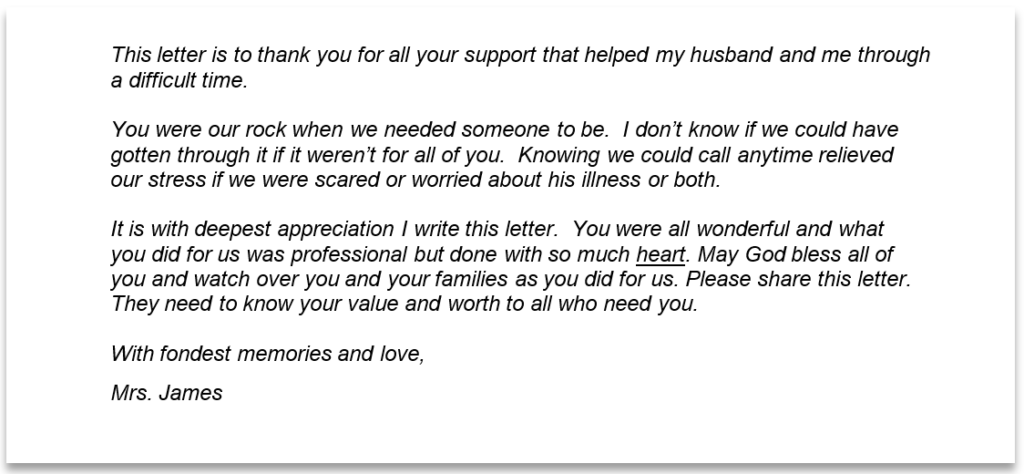

House Call Conversations: Palliative Care
When our patients develop the kind of serious illness for which palliative care is most important, we pay special attention to core palliative care principles.
Palliative Care Today
Palliative care is the interdisciplinary pursuit of quality of life in the setting of serious illness (credit: Dr. BJ Miller). It’s an approach in which we explore with seriously ill people what matters most to them and what causes them suffering. We responsibly guide them through complex decision making regarding their care choices. Then we nurture whatever creates meaning while ameliorating sources of suffering.
Landmark’s Patient-centered Focus
Landmark is a medical group that takes a patient-centered perspective on providing care. Our multidisciplinary team explores what matters to the people we care for—how they feel and what they need—and then designs a care plan that reflects those priorities and adjusts as those priorities change. We do this by being in the home—getting to know our patients, their family, and their pets. We make sure our patients have the correct medications and access to healthy food. We care for them when they’re sick—even at night and on weekends. We work closely with patients and family to help them understand when to call us at the beginning signs of a medical need which allows us to intervene—preventing hospitalization. If hospitalizations are required, we check in frequently and visit as soon as they’re back home to ensure they understand their discharge instructions.
When our patients develop the kind of serious illness for which palliative care is most important, we pay special attention to core palliative care principles. For example:
- We spend more time exploring our patients’ goals and fears.
- We aid patients and families in decision making aligned with the patient’s wishes.
- We share our knowledge about what the future might hold.
- We offer support to the patient’s family and caregivers.
- We assist with transitions across care settings.
- We help ensure the patient’s symptoms are managed.

Important Discussions with Patients and Family
Landmark clinicians are trained to explore goals and discuss prognosis with patients and families. We focus on patient well-being, in addition to conventional disease treatment. We use the Serious Illness Conversation Guide (SICG) as our framework for these discussions. The SICG is the centerpiece of Ariadne Labs’ Serious Illness Program, which has been shown to result in more, earlier, and better conversations between patients and their physicians. This can reduce emotional suffering, anxiety and depression. (Credit: Ariadne Labs)
The Conversation occurs between the patient, healthcare provider, and family or caregiver about what matters most to the patient, how they define quality of life, their future hopes, goals, fears, and who can advocate for the patient when s/he is unable.
The documents that emerge from the conversation are important but secondary to The Conversation itself.
Each community that Landmark serves has at least one Palliative Care Lead who is a provider, nurse, or social worker. The Palliative Care Lead has additional training or experience in palliative care and serves as a local resource for the interdisciplinary care team and their patients.
For patients with comfort-oriented goals and limited life expectancy, Landmark discusses with the patient and family how hospice may help. We continue our relationship with the patient through the transition to hospice and intermittently thereafter.
“Thank you so much for discussing hospice with my patient’s son. I agree completely that she is ready and will put in the referral right away.” -Dr. Fuller
How Landmark’s Palliative Care Model is Different
Some health plans offer dedicated community-based palliative programs that focus exclusively on patients with a limited prognosis. These programs usually focus on nursing and/or social work support at home.
Landmark’s model is different. While we offer nursing and social work support, most of our home visits are done by providers: MDs, NPs or PAs. This allows us to manage medical crises in the home more aggressively, reducing emergency room visits by 39% and hospital admissions by 28%.1
“Thank you so much for seeing my patient, the impact you have had on him has been great.” -Dr. Knutson
Palliative Care Impact for Community Providers
Through collaboration, Landmark supports community providers by reinforcing their care plan in the patient’s home. Many Landmark providers come from a primary care background. We recognize the challenge of managing medically complex patients and initiating difficult conversations during short office visits. We partner with community primary care providers to make their office visits more efficient and productive, and we tell them what we learn from being in the patient’s home.
As a patient progresses toward the end of life with serious illness, we provide compassionate care alongside community providers who have been integral in the patient’s wellness for decades.
“Thank you for your wonderful care of my patient and her family at the end of her life.” -Dr. Ozaydin
 Dr. Jill Denny is Medical Director of Palliative Care at Landmark Health. Board certified in Internal Medicine and Hospice and Palliative Medicine, Dr. Denny has worked as an ER physician, hospitalist, hospice physician, and palliative care physician.
Dr. Jill Denny is Medical Director of Palliative Care at Landmark Health. Board certified in Internal Medicine and Hospice and Palliative Medicine, Dr. Denny has worked as an ER physician, hospitalist, hospice physician, and palliative care physician.
References:
1. For Landmark patients in the first six months of engagement compared to the trend in utilization for statistically matched non-engaged patients. Chu, Lihao. A House-Call program that reduces unnecessary variation in utilization and spending among patients with poly chronic conditions. Academy Health Annual Research Meeting, June 25 2018, Seattle, WA. Unpublished conference paper. Landmark Health, LLC, Huntington Beach, 2018. Print.


Article
Why All Health Care Providers Need to Be Age-Friendly
Older adults will outnumber children by 2034 and yet the U.S. health care system is not focused on older patient's very specific needs

Blog post
Creating a Safe Home for Those with Alzheimer’s
Landmark providers specialize in home evaluations and modifications and can help adapt the home setting to meet patients’ needs.
 written by
written by